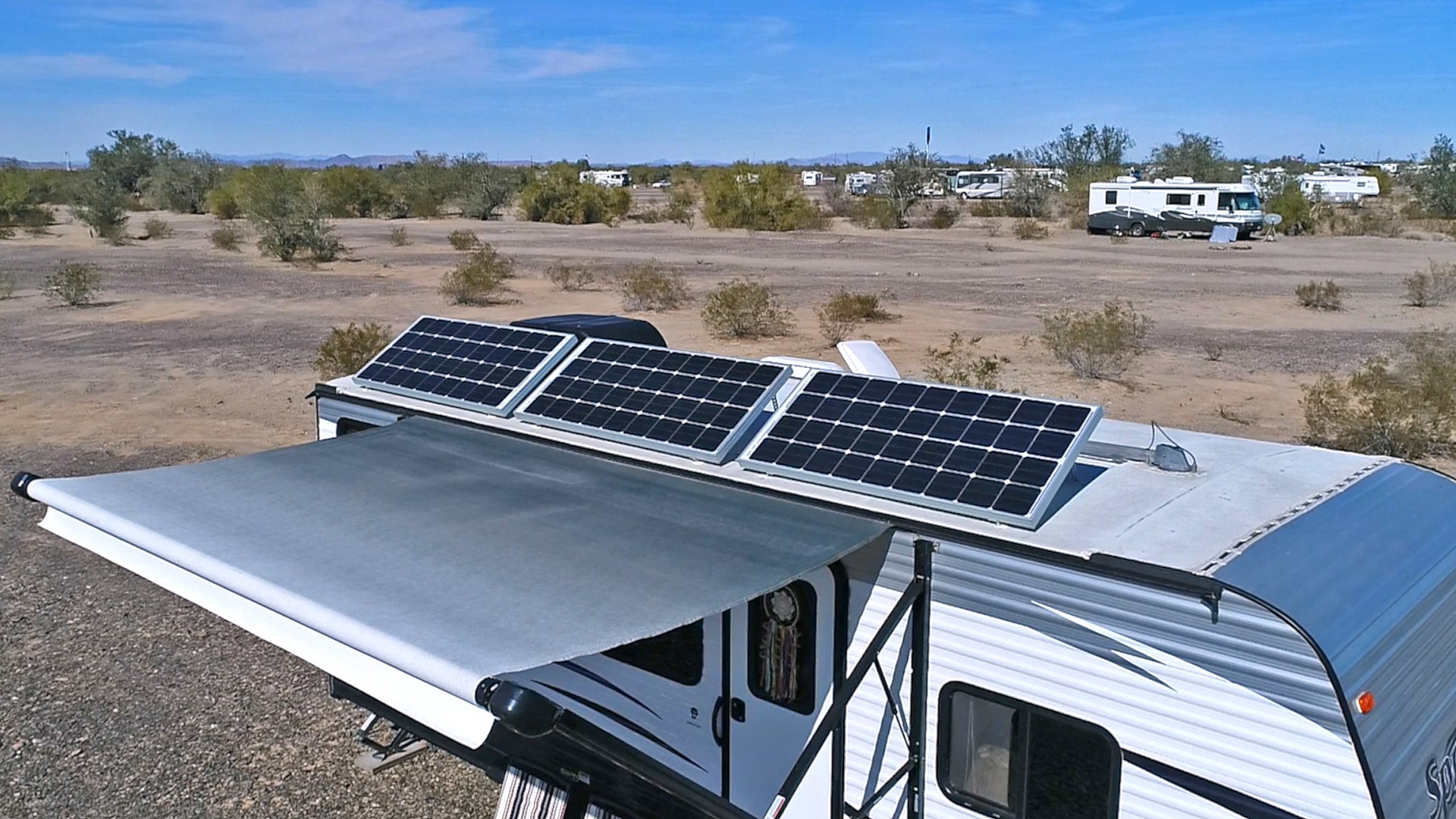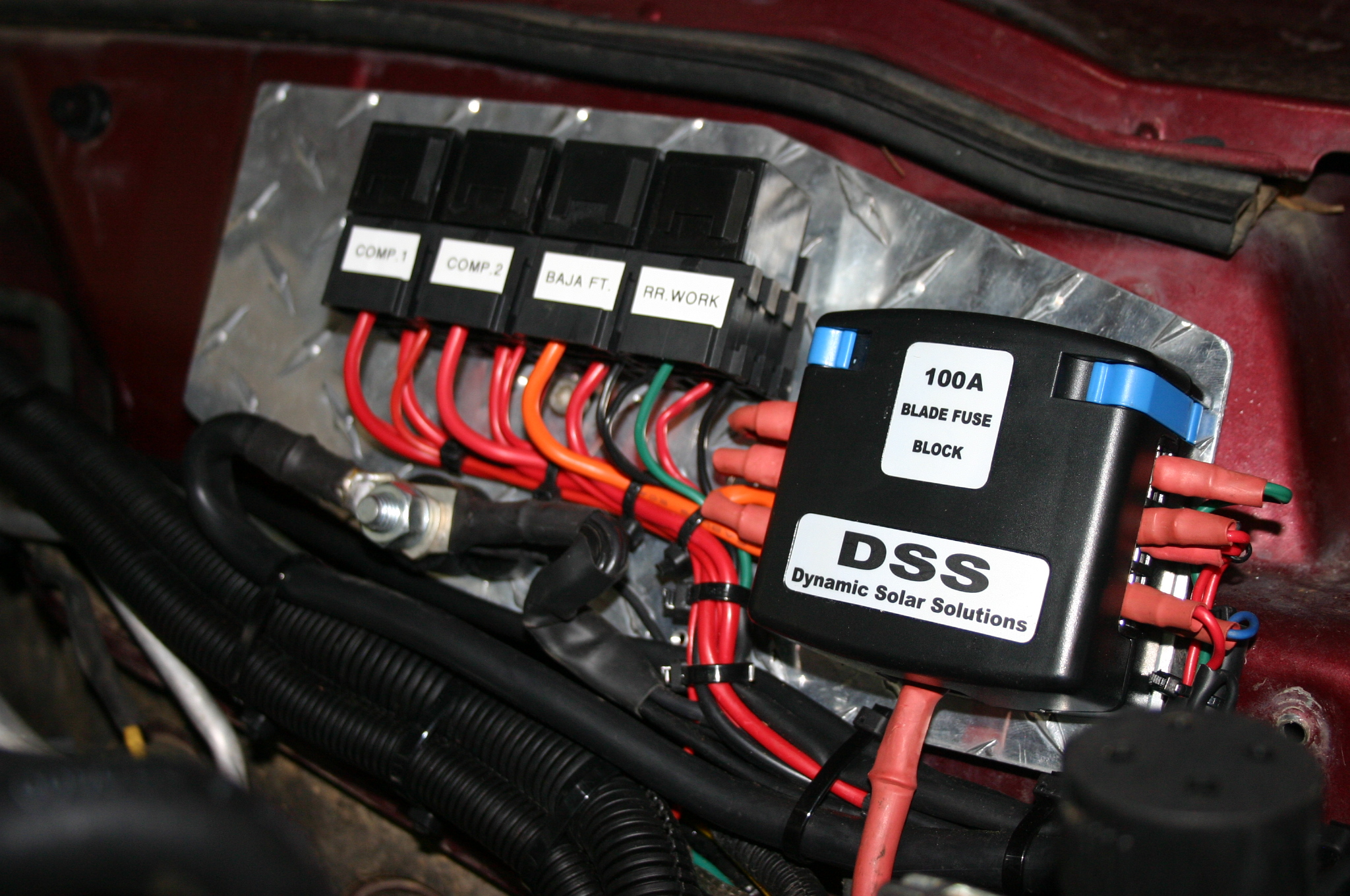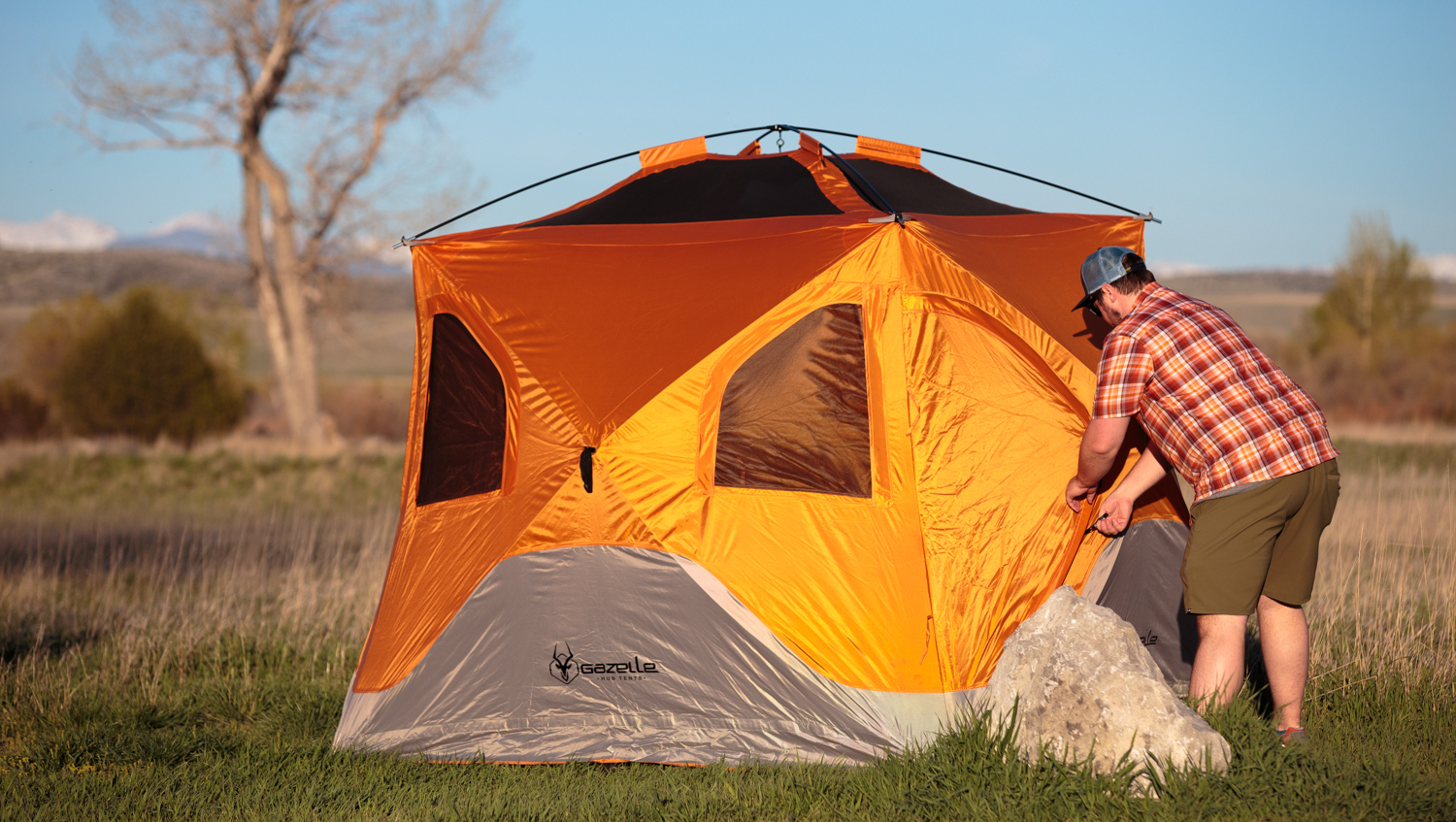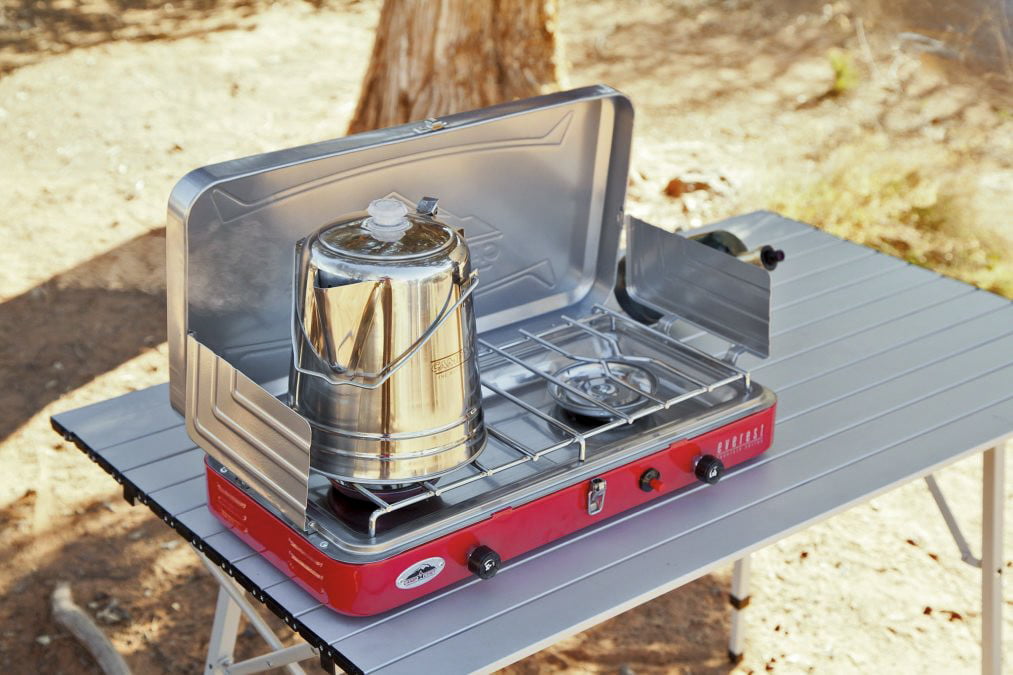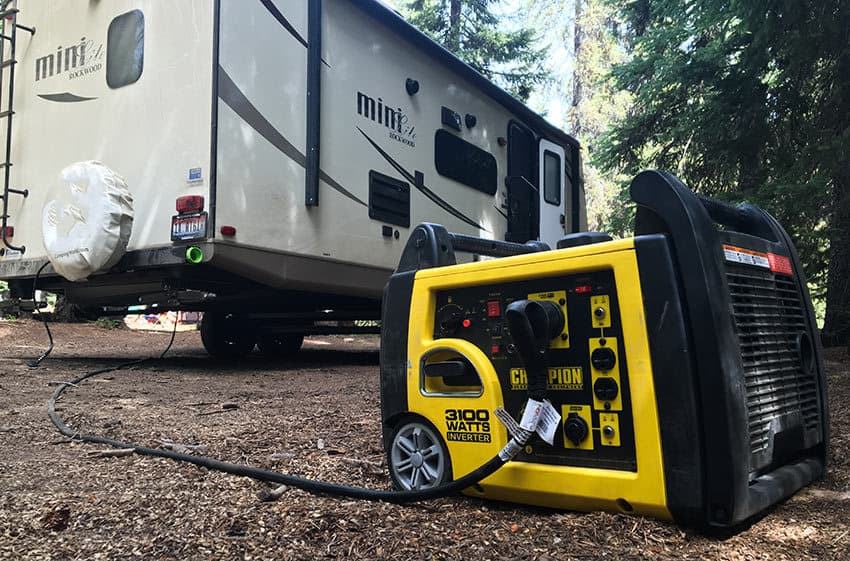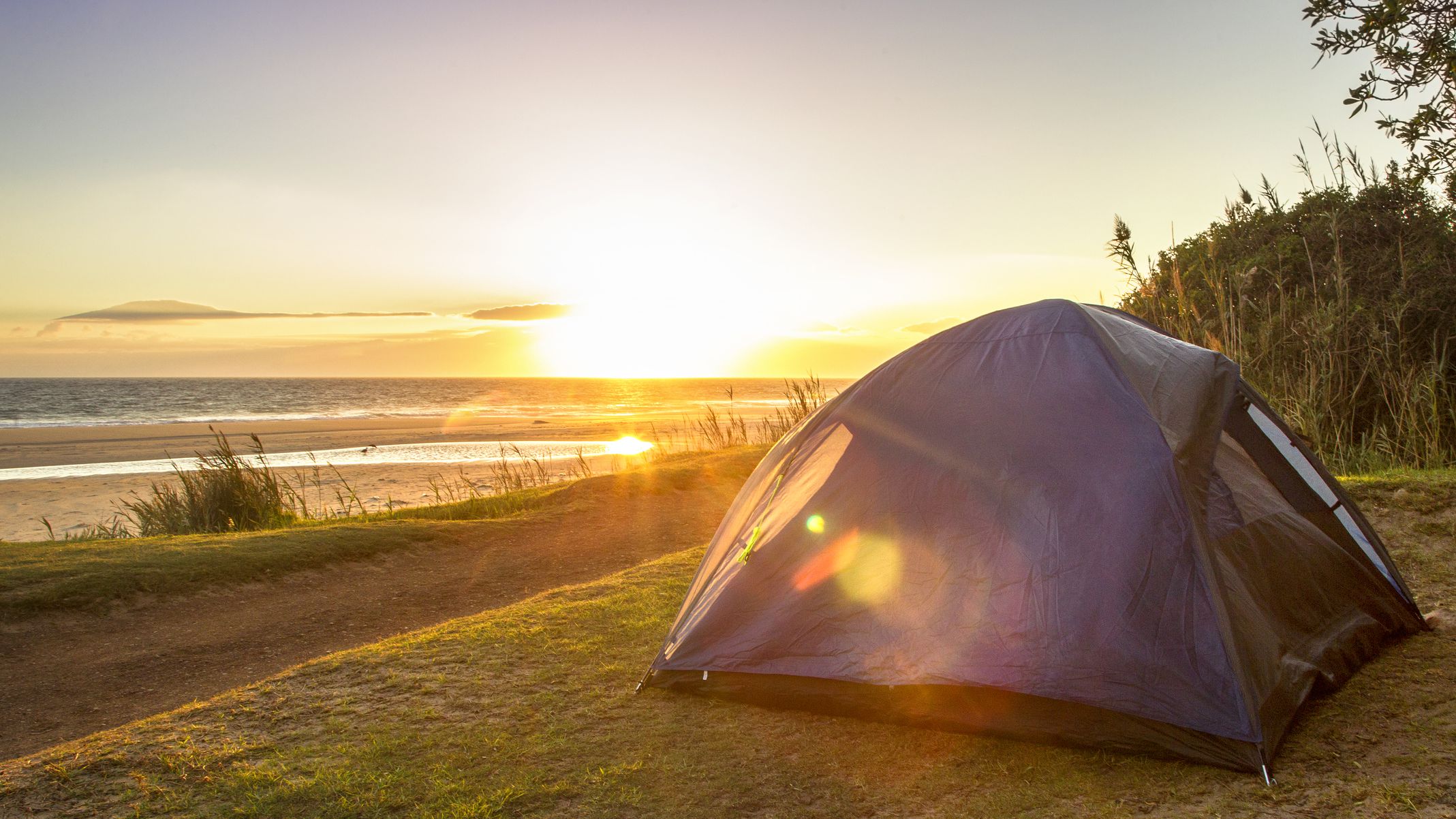Although not many people think of solar energy as a flawless source of power for RV, it nonetheless provides RVers with a lot of advantages. Compare to other common types of power, solar energy is environmentally friendly, quiet and renewable. Hence, more and more RVers want to grab the best solar panels for RV to make good use of sunlight shining on their vehicle roof. If you are also an RV enthusiast and want to go off-grid, you have to consider outfitting your recreational vehicle with quality solar panels. That is the only way you could achieve true freedom while traveling on an RV.
Contents
Comparison of Best RV Solar Panels
| Best Selling RV Solar Panel Models | Wattage | Prices | Our Reviews |
|---|---|---|---|
| Renogy 200W - Best Of The Best | 200 Watt | $$$$$ | 4.9/5 |
| Windy Nation 100W - Editor's Choice | 100 Watt | $$$ | 4.8/5 |
| Renogy 100W - Editor's Choice | 100 Watt | $$$ | 4.9/5 |
| HQST 100W Monocrystalline - Best Valued Solar Panel | 100 Watt | $$$ | 4.7/5 |
| Allpower 100W | 100 Watt | $$$ | 4.7/5 |
| Komaes 100W Polycrystalline | 100 Watt | $$$ | 4.7/5 |
| HQST 100W Polycrystalline | 100 Watt | $$$ | 4.8/5 |
Best Solar Panels for RV Reviews
If you are confused by the number of products, here are some RV solar panels reviews that you could use to make up your mind. They would tell you pretty much everything you should know about some of the best solar panels for RV available for purchase on the market.
1. Renogy 200W Solar Power Starter Kit – Best Of The Best

Specification
- Rating: 200 Watts, 12 Volts
- Dimension: 47 x 24 x 3 Inches
- Weight: 47 Pounds
Why This Is The Best
Able to deliver 1000Wh daily and charge a 50Ah battery from 50% to 100% in just 1.5 hours, Renogy 200W Solar Power Starter Kit is essentially one of best solar panels for RV. If you want to achieve true freedom on the road, you should take a good look at this powerful kit. Thanks to its impressive output and fast charging time, the kit perform admirably when it comes to off-grid travels. Designed for RVers that are new to solar power, the Renogy kit is easy to install and simple to use. In most of the case, you could get everything up and running by yourself in a blink of an eye.
Thanks to the LED indicators on the charge controller, you could tell the status of Renogy 200W Solar Power Starter Kit with a quick glance. Compare to other models available on the market, the Renogy kit possesses excellent protection against common mishaps such as reverse polarity, overcharging, overload, short-circuit,…
As the kit make good use of rugged frames and corrosion-resistant materials, its structural strength is second to none. From heavy snow to relentless downpour, the kit panels could handle pretty much every challenge.
Things we liked:
- Great output
- Short recharge time
- Reliable and dependable
Things we didn’t like:
- Slightly pricey
- Some wiring issues are noted
2. Windy Nation 100W Complete Solar Charging Kit – Editor’s Choice

Specification
- Rating: 100 Watts, 12 Volts
- Dimension: 40 x 1.4 x 26.4 Inches
- Weight: 10.86 Pounds
Why It’s An Editor’s Choice
At a relatively reasonable price, Windy Nation 100W Complete Solar Charging Kit offer RVers they need to harness clean and free energy from the sun. On average, the Windy Nation kit would generate around 350Wh per day which is not bad for the price tag. Needless to say, the power output provided by the solar panels on the field is affected by the sunlight condition. Hence, the model earns its well-deserved reputation as the best RV solar kit in term of all-around performance.
Featuring a high-class P20L charge controller, you would be able to quickly grasp the status of Windy Nation 100W Complete Solar Charging Kit. Essential ratings such as amperage, ampere hour, voltage, load draw and temperature are all displayed on the LCD screen display of the solar kit controller. Since the controller is compatible with batteries like lead acid, AGM, gel and others, you could replace the kit deep cycle battery if you want to. Thanks to the sensitive sensors, the kit is capable of making precise adjustments when it comes to overcharge/overdischarge voltages
Things we liked:
- Versatile and flexible
- Well made and rugged
- User-friendly LCD display
Things we didn’t like:
- Inconsistent performance between products
- There are several complaints about missing components
3. Renogy 100W Solar Power Starter Kit – Editor’s Choice

Specification
- Rating: 100 Watts, 12 Volts
- Dimension: 47 x 1.5 x 20.9 Inches
- Weight: 19.84 Pounds
Why It’s An Editor’s Choice
Like the idea behind Renogy 200W Solar Power Starter Kit but want something more affordable? Then you have to take a good look at Renogy 100W Solar Power Starter Kit. While the power output of this Renogy kit is not as good as its cousin, it’s nonetheless a quality choice for most RV setups. Depending on the availability of sunlight, the panels could provide RVers with 500Wh per day and fully charge a half-depleted 50Ah battery in 3 hours. The presence of pre-drilled holes on the back of the components guarantees straightforward as well as lighting fast installation.
Made for outdoor applications, Renogy 100W Solar Power Starter Kit could endure harsh working conditions without suffering any substantial damages. As the panels utilize high-transparency, anti-reflective glass, the conversion efficiency is quite good. Moreover, the kit could be expanded without much difficulty so you could be able to add additional panels at will. Similar to other Renogy models, the solar panel kit is equipped with a couple of electronic protections which preserve its integrity if something went wrong.
Things we liked:
- Quality made
- Highly affordable
- Compact and light
Things we didn’t like:
- Stiff connectors
- The charge controller is inflexible
>> Check out the best RV generator options here <<
4. HQST 100W Monocrystalline – Lightweight Solar Panel

Specification
- Rating: 100 Watts, 12 Volts
- Dimension: 41 x 21 x 0.2 Inches
- Weight: 2.9 Pounds
Why We Love It
In the aspect of cost-effectiveness, no product available on the market could overcome HQST 100W Monocrystalline Lightweight Solar Panel. For RVer that prioritize conversion efficiency/durability, the HQST model is the best solar panels for RV money can buy. Employing mono-crystalline cells on laminated plastic sheets, the panel is held in high regard as it could be handled in any way you like. Whether you want to install the panel to the roof or lay it on ground mounts, the installation remains straightforward.
As HQST 100W Monocrystalline Lightweight Solar Panel utilize laminated plastics instead of glass, the risk of shattering is extremely low. In addition to that, the weight of the HQST is quite light so you could move it around without wasting too much time and effort. When not in use, the panel should fit nicely in tight spaces as well as crowded rooms on your RV. However, it’s of utmost importance that you keep the panel far away from sharp objects to prevent unwanted damages.
Things we liked:
- Unable to be cracked or shattered
- Excellent service/post purchase support
- A quality portable solar panels for RV overall
Things we didn’t like:
- The warranty period is rather short
- Require additional components to work
5. Allpower 100W SunPower Solar Panel
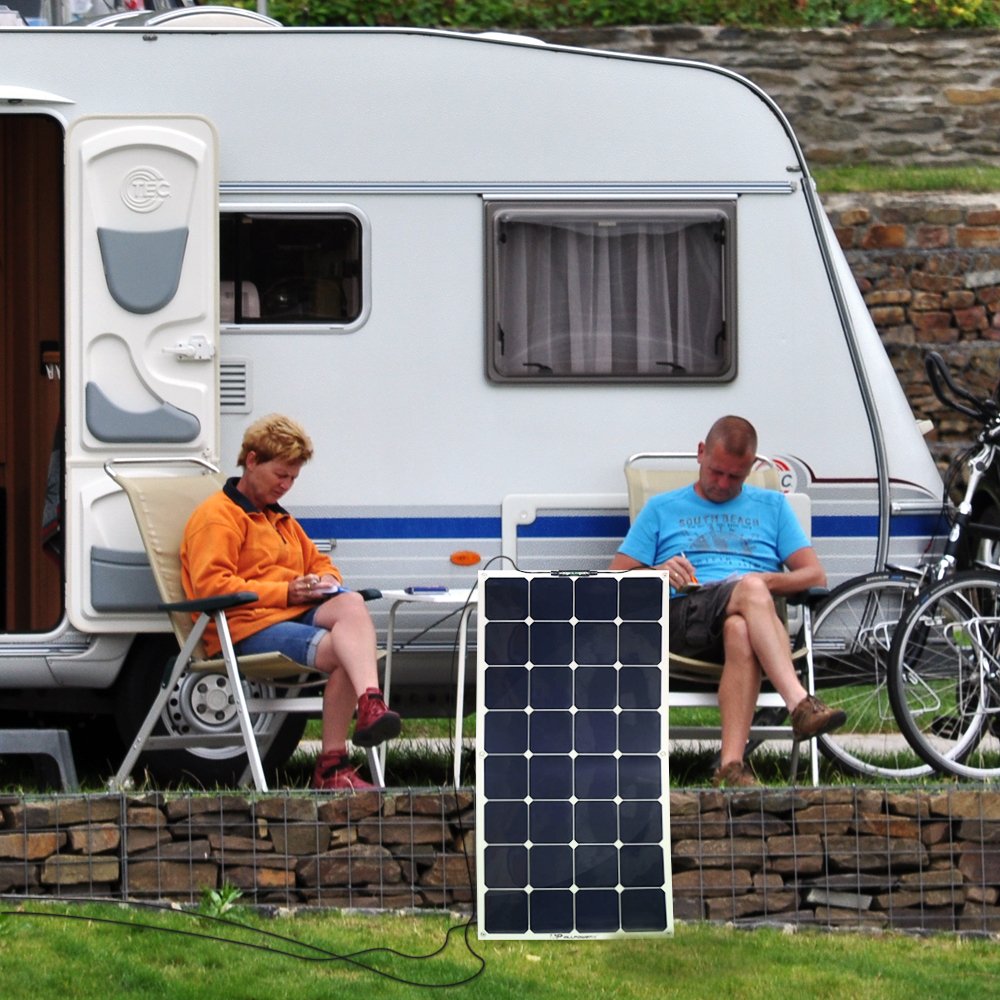
Specification
- Rating: 100 Watts, 12 Volts and 18 Volts
- Dimension: 42.6 x 21.5 x 1 Inches
- Weight: 5.65 Pounds
Why We Love It
Built from water-resistant, semi-flexible material, Allpower 100W SunPower Solar Panel could be mounted in a lot of ways. From uneven mounts to odd-angled roofs, the Allpower panel would be to tackle everything. The model is also one of the few products on the market nowadays that you could bend in order to better suit the installation surfaces. As a result, the panel works great in applications that are incompatible with rigid models.
The flexible and lightweight nature of the solar panel guarantees ease of transportation as well.
While Allpower 100W SunPower Solar Panel does seem to be a bit thin, it still possesses respectable endurance and resistance. For most of the time, the Allpower panel could effectively withstand violent wind and heavy snow encountered in the outdoors. The model is even able to endure 1-inch hail storms traveled at 50+ mph which is an indisputable proof of its top-of-the-line strength. As the panel is a frameless design that uses convenient metal-reinforced mounting holes, you could finish installing it in a blink of an eye.
Things we liked:
- Powerful and efficient
- Bendable up to 30 degrees
- Straightforward installation
Things we didn’t like:
- Tricky control layout
- Less than ideal customer service
6. Komaes 100W Polycrystalline Solar Panel – Efficient, Tough And Long-Lasting
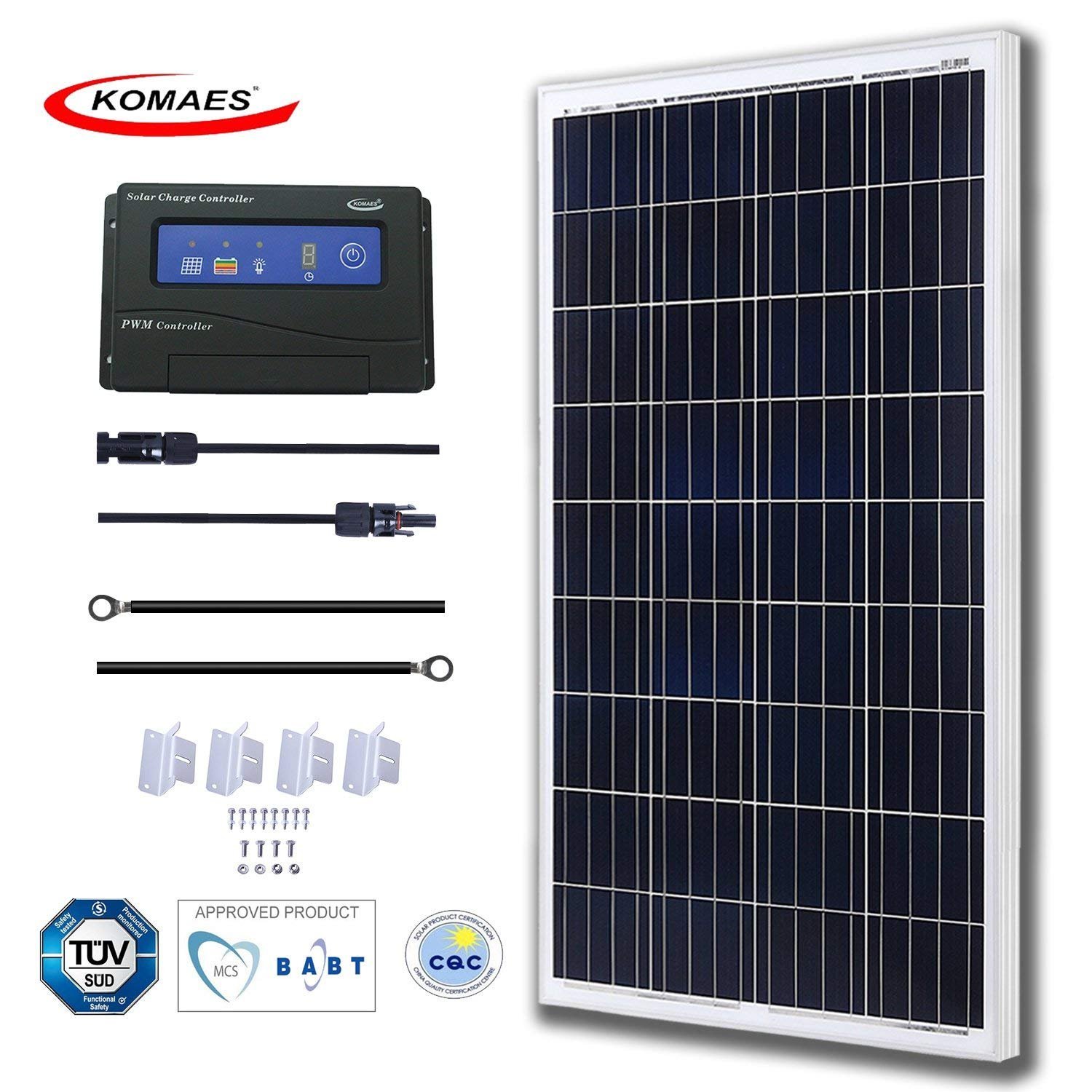
Specification
- Rating: 100 Watts, 12 Volts
- Dimension: 28.4 x 2.4 x 44.9 Inches
- Weight: 24.9 Pounds
Why We Love It
As a robust industrial class solar panel with high conversion efficiency and extended service life, Komaes 100W Polycrystalline Solar Panel is definitely a solid model. In normal working conditions, the Komaes panel could last for 25 years and that makes it an effective long-term investment. Most RV solar panels reviews appreciate the model ability to provide up to 500Wh per day and fully recharge a 50Ah battery at 50% in 3 hours. As long as the solar panel receives sunlight, it would automatically charge the system battery.
Similar to other products from its competitors, Komaes 100W Polycrystalline Solar Panel is able to handle outdoor elements and weather such as snow and wind. Thanks to the use of high grade monocrystalline and module layout, the Komaes panel works well in low light condition. The presence of quality tempered glass offers an admirable light transmission rate of 93% which further improve the panel conversion efficiency. Since the panel possesses pre-drilled holes on its back, it only takes a couple of moment to get the entire system up and running.
Things we liked:
- Quick installation
- Nice power output and efficiency
- Work well for most RV applications
Things we didn’t like:
- Unresponsive customer service
- Some customer receive broken components
7. HQST 100W Polycrystalline Solar Panel

Specification
- Rating: 100 Watts, 12 Volts
- Dimension: 40 x 27 x 1.5 Inches
- Weight: 19 Pounds
Why We Love It
For RVers that are new to solar power, HQST 100W Polycrystalline Solar Panel is a forgiving product to work with. Featuring pre-drilled holes and Z brackets, the HQST model could be installed in a relatively short period of time. With an output of 500Wh and a charging time of 3 hours for half-depleted 50Ah battery, the kit is a great choice to novice RVers. Aside from transmitting sunlight to the polycrystalline cells, the panel tempered glass also serves as a durable layer of protection.
Capable of resisting loads of rain and snow, HQST 100W Polycrystalline Solar Panel performs flawlessly in challenging environments and weather. Because of that, the HQST kit should fit the needs and requirement of most outdoor applications you could think of. In the aspect of post-purchase support, you are provided with a 5-year material and workmanship warranty as well as a 25-year power output warranty. All accessories that accompanied the panels are backed with a 1-year material and workmanship warranty.
Things we liked:
- Best suited for off-grid trips
- Attractive and long-lasting post-purchase support
- The best solar panels for RV beginners could get
Things we didn’t like:
- The charge controller could use some improvements
- Several people receive duplicate parts in their kits
Find The Best Solar Panels For RV: Tips And Tricks
In the usual case, it’s unwise to make a purchase without proper thinking as you may waste money on a less than ideal product. Right down below are a couple of tips and tricks you have to keep in mind while shopping for the best solar panels for RV
Check Out the Power Output
The power output of solar panels is determined by the number of watts each cell is able to could produce. So the higher the output rating, the more devices and facilities the panels could sustain. It’s beneficial to go after models that have high outputs as they become more productive as time goes by. That being said, the best solar panels for RV are not always ones that got the highest output ratings around. Furthermore, high wattage solar panels often come with high acquisition costs and that is why you must come up with a well-thought shopping budget. There is no real need to strain your wallet in order to buy a couple of solar panels for RV. Generally speaking, it’s a good idea to start with a 2-panel set and add more panel later if needed.
Assess The Panel Resistance/Endurance
Since solar panels would be exposed directly to the weathers and outdoor elements, they inevitably suffer from wear and tear. Even the best solar panels for RV are unable to remain in operation indefinitely but that doesn’t mean it’s fine for you to underestimate the issue of durability. In fact, RVers should refrain from getting cheap low-quality models as those could not last long on the field. For most of the time, prioritize rugged and weather resistant products if you don’t want to keep replacing the solar panels every few months. In any case, exam and inspect the materials in order to make sure that the product you choose in the end is of good quality.
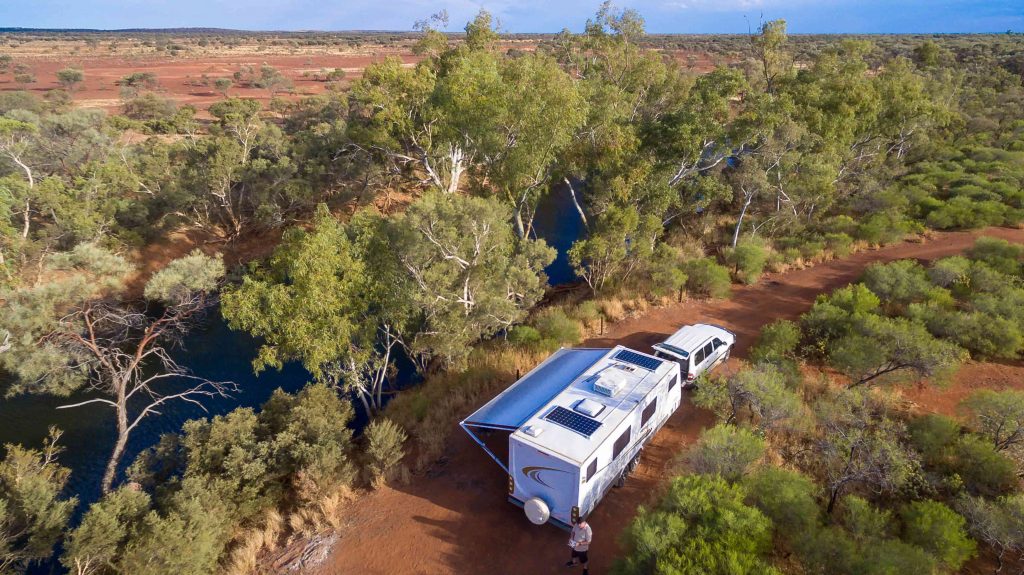
Take Conversion Efficiency Into Consideration
Given the fact that space on recreational vehicles is limited, you would want something that only occupies a little room and still offer optimized performance. Therefore, one of the most important factors to think about when it comes to solar panels is the conversion efficiency. If you want to get the best solar panels for RV, you have to keep a close eye on the conversion efficiency of market products. Depending on the material and layout, the conversion efficiency of solar panels for recreational vehicles could be below 10% or above 20%.. Similar to power output, most solar panels on the market that have high conversion efficiencies tend to be fairly expensive.
RELATED REVIEWS
- Best RV Surge Protector: An Analysis Of Top Rated Products
- Best RV Deep Cycle Battery – Ultimate Buyer’s Guide!
Exam And Inspect The Profile
It may get pretty troublesome going around with a bulky and cumbersome set of solar panels on your RV roof. So it’s essential that you go after a compact and lightweight solar panel model. There is a limit to the amount of weight the RV top section could support which mean don’t go overboard with the solar panels. Nowadays, you could find a wide variety of portable solar panels for RV, they are designed to be deployed and put away at moment notice. Those models are the best solar panels for RV if you really wish to retain the appearance of your RV. In any case, make sure that you don’t compromise other criteria while trying to locate an RV solar panel model with a suitable profile.
Think About Ease-Of-Installation
Numerous RV solar panels reviews place ease-of-installation among of the most essential criteria that RVers need to remember. Generally speaking, you could always drop by an RV workshop and let the professionals install the solar panels for you. However, hiring someone to take care of the installation would lead to additional expenses and you already invest a lot of money in the panels. Moreover, there are times when you have to uninstall and reinstall the panels while having no access to a mechanic. So if you want to cut down unnecessary spending and have a smooth trip, check out the installation process of models you like before deciding.
Types Of RV Solar Panels: What You Have To Remember
In order to secure the best solar panels for RV use, you need to have a firm grasp on the characteristics of different panel types. Currently, there are 3 types of solar panel available for purchase on the market: mono-crystalline, poly-crystalline and thin film.
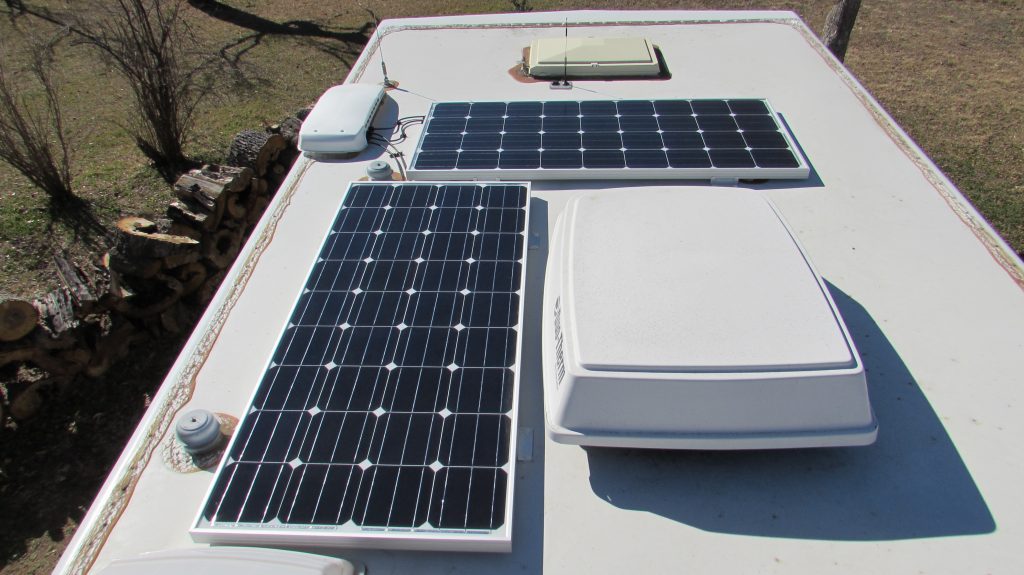
1. Mono-Crystalline
Made from large silicon crystals, mono-crystalline style panels are considered by many RVers to contain some of the most efficient models money can buy. The usual conversion efficiency of these panels is around 20% which is excellent for recreational vehicles. Furthermore, products in the category could deliver impressive amounts of energy in partially-shaded environments along with low light conditions. On the other hand, mono-crystalline solar panels tend to be more expensive than others.
2. Poly-Crystalline
Compared to their mono-crystalline counterparts, poly-crystalline solar panels have lower efficiencies and outputs. Besides that, these solar panels are sensitive to surrounding temperatures as well and their overall lifespan is far from ideal. In exchange, this particular type of solar panel is highly affordable and that makes it suitable for large size RVs. Nowadays, poly-crystalline style panels are among the most commonly used products when it comes to budget solar power setup.
3. Thin-Film
Also known as amorphous silicon, solar panels that utilize thin-film are superior to other products in term of flexibility. You should be able to integrate thin-film solar panel to a lot of surfaces and objects with relative ease. In fact, some of the best portable solar panels for camping belong to this category. Since thin-film panels consume comparatively less materials and efforts, they have rather cheap prices. On the downside, the efficiency of thin-film solar panels is pretty low (roughly 7 – 10%) and most models have short lifetimes.
>> You may also like: RV Electrical: All The Basics You Need To Know! <<
Portable Panels Vs. Fixed Panels: The Difference?
Once you decide to put solar panels on your RV, would you go for portable panels or fixed ones? Needless to say, there are pros and cons to both styles. For most of the time, portable solar panels are highly sought after by RVers that want to keep things mobile. As the name suggests, you should be able to move and set up these solar panels as you see fit. In exchange, the output of standard portable solar panels for RV batteries rarely exceeds 200 watts. As a result, you may have to connect multiple portable panels to achieve desired power outputs but that method would get more and more inefficient as the energy requirement grow.
Mounted permanently to the recreational vehicle roof, fixed solar panels require no preparation before use. In the aspect of power output, fixed panels perform much better than their portable counterparts. Since they are installed up high, there is no real need to rotate and adjust fixed panels to follow the sun as with portable panels. However, these panels are not exactly ideal in the case you don’t need solar power on a continuous basis. In addition to that, if you prefer to park your vehicle amongst the trees for shade, fixed panels would not produce a lot of power. Take your needs and requirements into account and you shall know what type of solar panel you need to use.
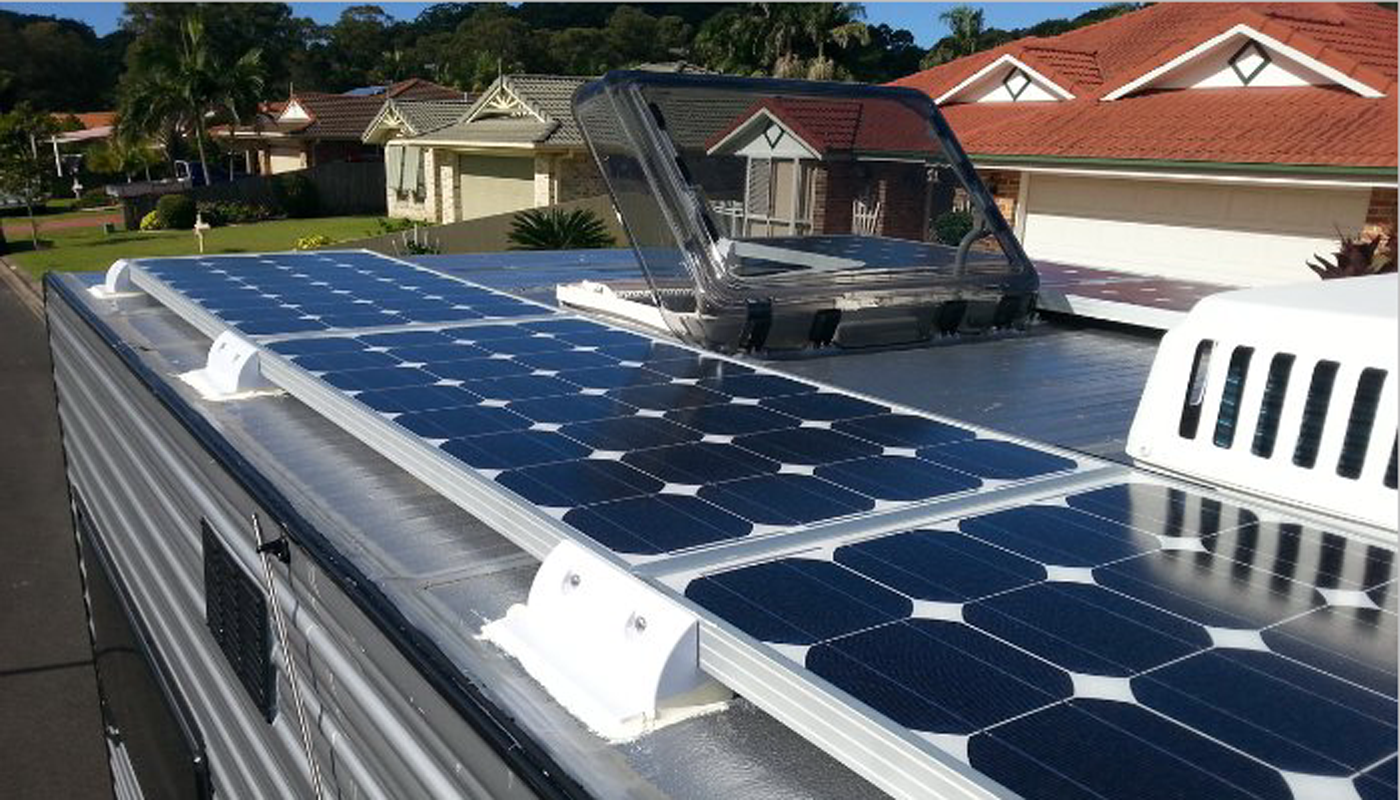
Benefits Of Keeping The Best Solar Panels For RV Around
Solar panels for RV roof receive worldwide popularity due to a large number of benefits they provide to their users. Check out the below and see why you have to install the best RV solar kit to your vehicle roof.
- Protect The Environment
Because solar panels produce energy using direct sunlight, you don’t really have worry about things like wastes and emissions. If you truly care about the environment and wish to minimize pollution in the surrounding area, you should equip your recreational vehicle with solar panels.
- Enjoy A Quiet Trip
There are no moving parts in solar panels and that means they don’t generate any mechanical noise in operation.
For RVers that want to have a quiet and peaceful experience on the road, solar panels are definitely great additions.
- Gain Access To Limitless Power
Due to the fact that solar power is a renewable source of energy, it never runs out as long as the sun is still shining. So with the best solar panels for RV by their side, RVers could casually supply their vehicle with limitless power no matter where they are.
FAQs About Solar Panels For RV
How Do Solar Panels Work?
The operation principle of solar panels is simple: Every time sunlight hit their surfaces, the panels would generate electric currents. Next, the currents are forwarded to a charge controller and depending on the setting, a specific amount of current would be fed to the battery. Utilizing the current, the battery produces DC powers that pass through an inverter and become AC powers before reaching devices such as laptops, phone chargers, …
What Is The Optimum Number Of Solar Panels For RV?
Different RVs would likely require a different number of solar panels as the energy requirement varies from case to case. In order to determine how many panels you need, take some time and effort to calculate the daily power consumption of your own recreational vehicle. Once you are done, compare the result with the output of your preferred solar panel model and you would know the answer to this question.
Is It Necessary To Purchase Hardware Before Installing The Panels?
In most of the case, various components of ordinary solar power setups have to be secured and protected by a couple of purpose-design hardware. Some notable items include mount adapters, mounting L-feet, T-knobs, tilt bar sets, tape,… Fortunately, if you are able to acquire the best RV solar kit, there is no need to make additional purchases as you would be provided with virtually all necessary hardware.
Last Updated on January 1, 2024
